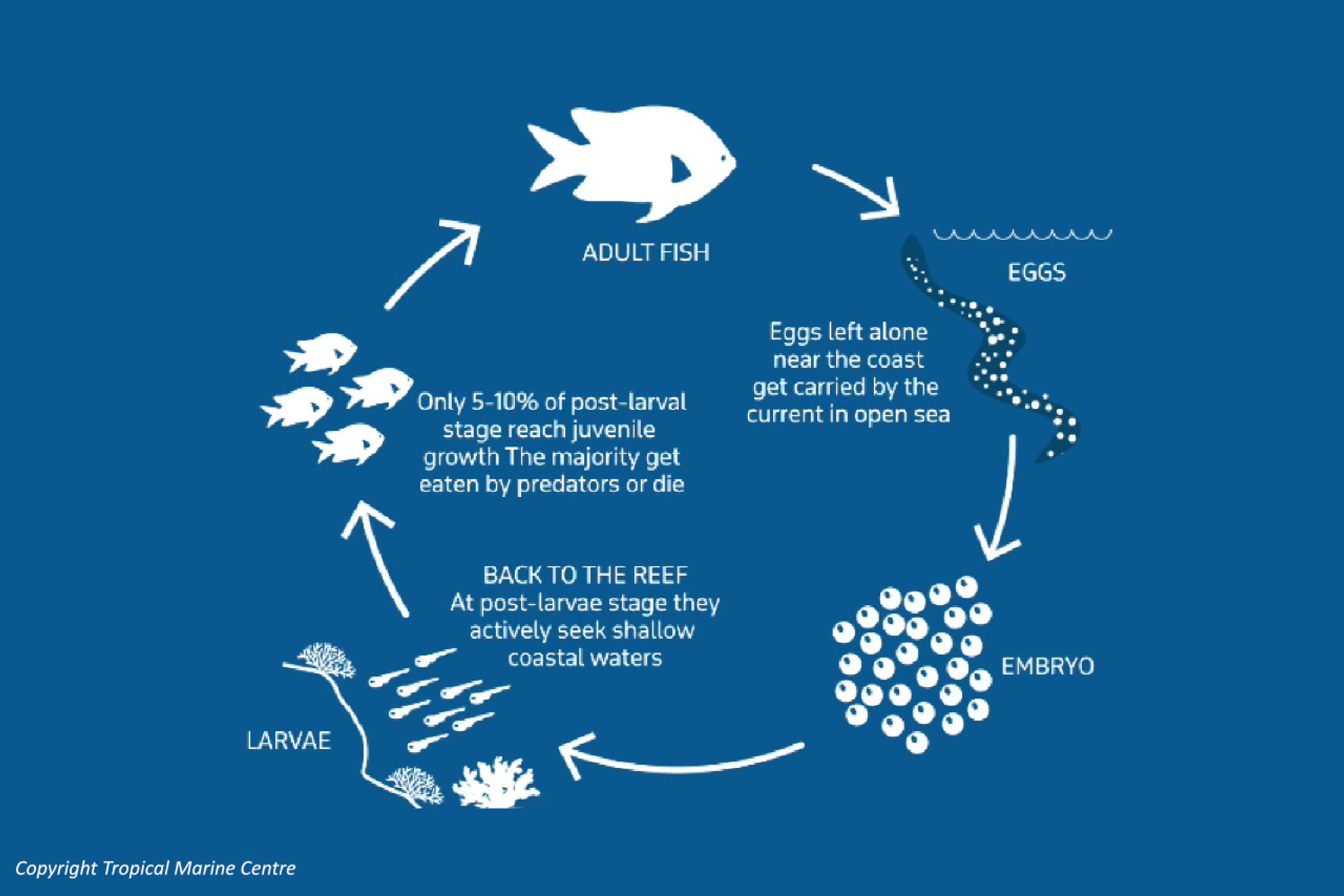Quality Marine Supports Ranched Marine Species (Post-Larval Capture and Culture: PCC)

Ranching marine species and the concept of post-larval capture and culture might be unfamiliar terms to some, but they are not entirely new in the realm of marine conservation. The term 'fish ranching’, as defined by the Dictionary of Environment and Conservation, refers to the practice of holding fish species in captivity after their initial life stages and subsequently releasing or harvesting them when they reach adulthood. In an exciting partnership, Quality Marine, in collaboration with Tropical Marine Center (TMC) in the UK and ecocean, have embarked on a program that centers on ranching species using night light traps.
In this innovative approach, post-larval fish are drawn to light and gather in specially designed illuminated traps. These night light traps can be deployed in various marine environments and are currently in use in several locations. The origins of this concept trace back over two decades and was initially tested to quantify the distribution and abundance of larval fishes, and also as a stock-enhancement release program for coral reef species. The research findings suggested that the traps yielded better results when strategically placed in specific habitats, and notably, higher survival rates were observed when juvenile fishes were released into the ocean at a more advanced stage of development. Different ecological studies are currently underway to assess how environmental factors impact fish recruitment, diversity, mortality rates, and habitat selection during settlement.
Sustainability stands at the forefront, for the long-term viability of our trade and the well-being of our aquatic habitats, and our commitment to supporting these types of programs as well as land-based and in-situ aquaculture continues and grows. The method of capturing tiny post-larvae species solely through light-based techniques not only augments sustainable wild harvest, but also complements our aquaculture efforts. By cultivating and raising these species within a controlled environment, they are protected from predation, which significantly increasing their chances of survival. This initiative proves especially significant since a substantial portion of larvae species in the wild, never reach maturity due to natural attrition. Moreover, healthy ranched marine species exhibit far greater survival rates than their counterparts left to fend for themselves in the open ocean. Any surplus populations not destined for the aquarium trade can be released back onto the reef at a juvenile stage where their chances of survival increase significantly, which contributes to the replenishment of wild reef species populations.
Our decision to embark on this project has allows us to both strengthen existing partnerships that support small island communities and forge new ones. This support translates into improved economic well-being and an additional income source for these communities. Furthermore, the program strengthens our collaboration with local scientists and researchers, bolstering efforts to promote conservation.
 Currently, Quality Marine is receiving a variety of ranched
species through these ranching activities using night light traps, and include
species of Cardinalfish, Damselfish, Grunts, and Chromis. Upon arrival, these tiny
specimens undergo a careful acclimation process to adjust to their new water
parameters. During their stay at Quality Marine, these ranched species are
under the care of resident biologists and experienced husbandry team.
Subsequently, they are transitioned to prepared diets, which include Nutramar
dry diets and Gamma Frozen Foods. Holding and growing these ranched,
post-larvae fishes for period of time, allows them to grow to a marketable size
and become well-adjusted to aquarium environments.
Currently, Quality Marine is receiving a variety of ranched
species through these ranching activities using night light traps, and include
species of Cardinalfish, Damselfish, Grunts, and Chromis. Upon arrival, these tiny
specimens undergo a careful acclimation process to adjust to their new water
parameters. During their stay at Quality Marine, these ranched species are
under the care of resident biologists and experienced husbandry team.
Subsequently, they are transitioned to prepared diets, which include Nutramar
dry diets and Gamma Frozen Foods. Holding and growing these ranched,
post-larvae fishes for period of time, allows them to grow to a marketable size
and become well-adjusted to aquarium environments.
Sustainability remains a core value of Quality Marine, ingrained in our company's history. Our commitment to supporting ranched species was an easy decision. Looking ahead, our aspirations are directed toward streamlining this process through ongoing research and encouraging more coastal fisheries to embrace similar programs. We anticipate continued partnerships and collaborations with scientists and researchers in remote locations across the globe.
https://www.frontiersin.org/articles/10.3389/fmars.2021.718526/full#B31
